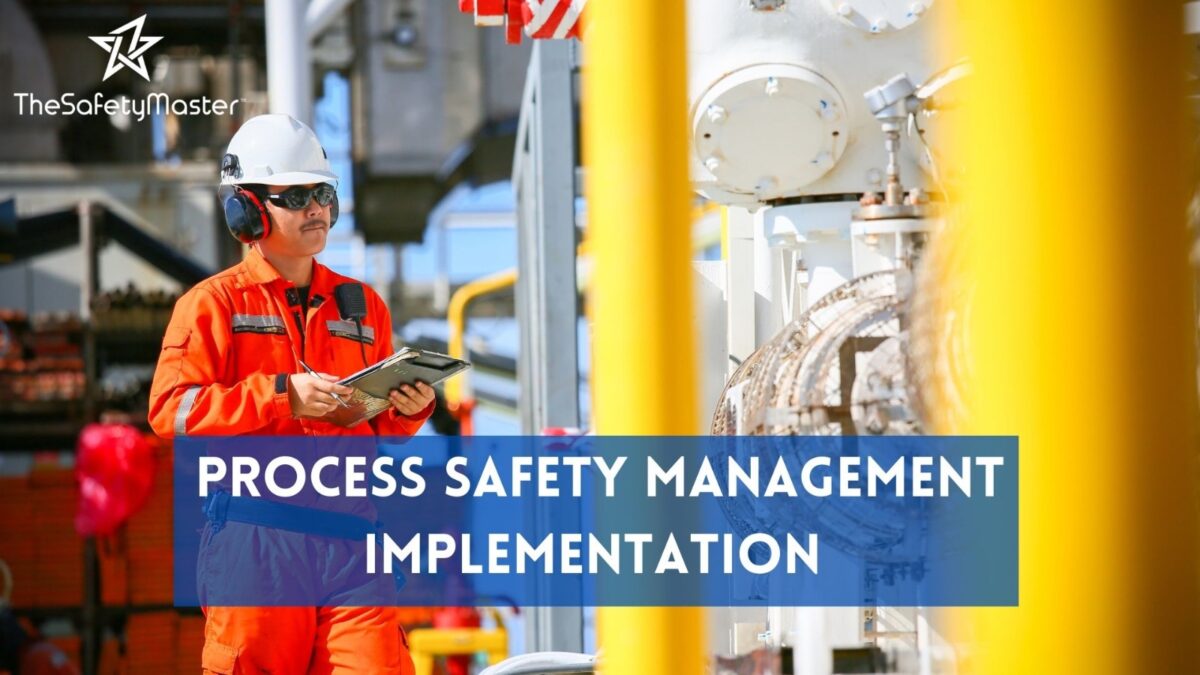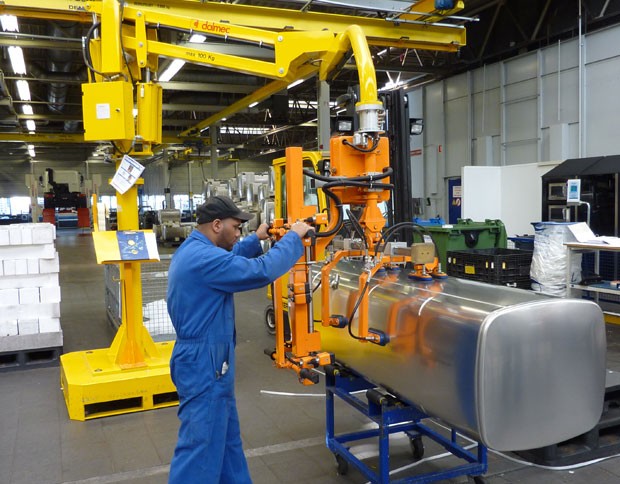Tackling Emergencies with Confidence – The Role of Process Safety Management in Indian Industries

The Vital Importance of Regular Electrical Safety Audits in Indian Manufacturing Facilities
November 23, 2023
Proactive Measures for Fire Prevention: Implementing Fire Safety Audits in Indian Industries
December 8, 2023In this article, we delve into the critical importance of Process Safety Management (PSM) in Indian industries and how it plays a pivotal role in tackling emergencies with confidence. From chemical manufacturing plants to oil refineries, these industries face numerous risks that can result in disasters if not managed effectively. We explore the challenges they encounter and examine how PSM provides a comprehensive framework for preventing accidents, protecting employees and the environment, and ensuring business continuity. Read on to discover the key components of PSM and how it empowers Indian industries to navigate emergencies with unwavering confidence.
Introduction
Emergencies can strike at any given moment, leaving organizations in a state of chaos and uncertainty. In the realm of Indian industries, where safety measures are of paramount importance, it becomes imperative to address these emergencies with confidence and competence. This is where the role of Process Safety Management (PSM) takes centre stage. We will uncover the key components that make up an effective PSM system, discover successful case studies that showcase its implementation, and understand how it contributes to a safer working environment for employees
Understanding the Concept of Process Safety Management
In the realm of industrial safety, process safety management (PSM) stands as a formidable fortress against potential disasters. PSM encompasses a comprehensive approach to identifying, understanding, and mitigating risks associated with chemical processes in industries. It encapsulates the diligent implementation of systems and practices to prevent accidents and safeguard human lives, property, and the environment. At its core, process safety management is rooted in a deep understanding of inherent hazards present in industrial processes. It entails recognizing potential risks that arise from factors such as equipment failures, human error, or external events. By carefully analysing process hazards and their potential consequences, companies can proactively develop robust strategies to minimize or eliminate those risks altogether.
Process safety management strives to instil a culture of vigilance within an organization by promoting awareness among employees about the importance of following safety protocols. Through effective communication channels and comprehensive training programs, workers are empowered to identify potential hazards promptly and take necessary preventive measures. By fostering a collective responsibility for safety at every level of the organization, process safety management creates an environment where everyone feels confident in handling emergencies with poise.
Remember: Process Safety is not just about complying with regulations; it is about going beyond expectations by embracing a proactive mind-set that prioritizes human lives above all else.
The Importance of Process Safety Management in Indian Industries
Indian industries play a pivotal role in fuelling the nation’s economic growth and development. However, with industrialization comes potential risks and hazards that can pose a threat to both human life and the environment. This is where the importance of process safety management becomes paramount. Process safety management ensures that proper measures are in place to identify, assess, and mitigate risks associated with industrial processes. Effective process safety management enables Indian industries to safeguard their employees, assets, and reputation while enhancing overall operational efficiency. It serves as a proactive approach to prevent accidents, incidents, and emergencies by implementing robust safety protocols throughout all stages of the industrial processes. By prioritizing process safety management, Indian industries not only protect lives but also foster a culture of safety consciousness among their workforce.
Process safety management also plays a crucial role in complying with regulatory standards and requirements set by government authorities. By adhering to these standards, Indian industries demonstrate their commitment towards maintaining a safe working environment for their employees as well as safeguarding nearby communities from potential hazards. Moreover, an effective process safety management system not only minimizes the likelihood of accidents but also reduces operational downtime, resulting in increased productivity and profitability for Indian industries
Key Components of an Effective Process Safety Management System
Key Components of an Effective Process Safety Management System: A critical aspect of ensuring the safety and well-being of employees in Indian industries is the implementation of an effective process safety management system. This system comprises several key components that work together to minimize the risk of accidents, mitigate hazards, and foster a culture of safety within the organization.
Firstly, establishing clear safety policies and procedures forms the foundation of an efficient process safety management system. These policies outline the expectations for safe operating practices and empower employees to prioritize safety in their day-to-day activities. By clearly communicating these expectations, organizations can create a shared understanding that safety is paramount.
Secondly, conducting a comprehensive process hazard analysis is vital in identifying potential risks and developing appropriate control measures. This analysis involves systematically examining each step in the production process, identifying potential hazards, evaluating their likelihood and consequences, and implementing effective safeguards to prevent incidents from occurring.
Lastly, implementing robust safety training programs equips employees with the knowledge and skills needed to handle emergencies confidently. These programs should cover various aspects such as emergency response protocols, proper use of personal protective equipment (PPE), communication during crises, and regular drills to ensure readiness. By investing in continuous training initiatives, organizations demonstrate their commitment to enhancing employee competence while fostering a proactive culture of preparedness.
By integrating these key components into their process safety management systems, Indian industries can enhance their overall operational resilience while safeguarding human lives and valuable assets. Embracing a proactive approach not only ensures compliance with regulatory standards but also boosts employee morale by instilling confidence that their well-being is prioritized at all times.
Establishing Clear Safety Policies and Procedures
Establishing Clear Safety Policies and Procedures: In order to ensure a safe and secure working environment, it is imperative for Indian industries to establish clear safety policies and procedures. These guidelines serve as the foundation for process safety management, providing employees with a clear framework within which to operate. By clearly defining expectations and standards, organizations can promote a culture of safety consciousness among all members of the workforce.
One crucial aspect of establishing clear safety policies is the development of comprehensive standard operating procedures (SOPs). These SOPs outline step-by-step instructions for various tasks, enabling employees to carry out their duties with precision and caution. Moreover, they serve as a valuable reference in emergency situations, ensuring that appropriate actions are taken promptly to mitigate potential risks.
Additionally, effective communication plays an instrumental role in promoting adherence to safety protocols. Regular training sessions and awareness programs should be conducted to educate employees about the importance of following established policies. By fostering open lines of communication between management and staff, organizations can cultivate an atmosphere where employees feel comfortable reporting potential hazards or suggesting improvements to existing procedures. Ultimately, establishing clear safety policies and procedures empowers individuals at every level of an organization, setting the stage for a safer workplace that enables optimal productivity and growth.
Conducting a Thorough Process Hazard Analysis
Conducting a Thorough Process Hazard Analysis: In order to prevent potential catastrophic incidents, it is crucial for Indian industries to perform a comprehensive process hazard analysis (PHA). This systematic approach involves identifying and evaluating the hazards associated with each step of the industrial process. By analysing the potential risks, companies can develop effective strategies to mitigate them and ensure a safe working environment for their employees.
During the PHA, experts carefully examine every aspect of the process, considering factors such as equipment failure, human error, and external influences. They scrutinize the chemical substances involved, operating procedures, and potential deviations that could compromise safety. By assessing these elements in detail, companies gain valuable insights into areas that require improvement or modification.
An optimistically-driven approach to conducting a thorough PHA instils confidence in industries as they are proactively taking measures to identify and eliminate potential hazards. This empowers workers by fostering a culture of safety where they feel protected and valued. Ultimately, investing time and resources into such analysis enhances not only employee well-being but also productivity and profitability – ensuring a brighter future for Indian industries.
Implementing Effective Safety Training Programs for Employees
Implementing Effective Safety Training Programs for Employees: Safety training programs play a crucial role in equipping employees with the knowledge and skills necessary to handle emergencies with confidence. These programs aim to raise awareness about potential hazards, promote safe work practices, and instil a culture of safety within the organization. Through engaging workshops, interactive simulations, and comprehensive training materials, employees are empowered to identify risks, respond effectively during emergencies, and prevent accidents.
A thought-provoking approach to safety training involves integrating real-life scenarios into the learning process. By simulating emergency situations specific to their industry, employees can practice their response strategies in a controlled environment. This not only enhances their problem-solving abilities but also boosts their confidence in handling critical situations. Additionally, incorporating gamification elements like rewards or friendly competitions can make safety training more engaging and enjoyable for employees.
To ensure effectiveness, safety training programs should be tailored to address the unique needs of each department or job role. By customizing the content based on specific job requirements and potential risks involved, employees gain practical insights that are relevant to their daily tasks. This personalized approach fosters a sense of ownership and responsibility towards safety within individuals, creating a positive ripple effect throughout the organization.
By investing in comprehensive safety training programs that are engaging, customized, and realistic, organizations can empower their workforce to become vigilant guardians against emergencies. Such initiatives instil a sense of pride among employees for being part of an organization that prioritizes their well-being while fostering an optimistic workplace culture cantered around safety consciousness.
Ensuring Proper Equipment Maintenance and Inspections
Maintaining robust equipment maintenance and inspection procedures is crucial for ensuring process safety in Indian industries. Diligent attention to equipment condition helps prevent any unexpected failures or malfunctions that could lead to emergencies. Regular inspections should be carried out by competent personnel who have a keen eye for identifying potential issues. Thorough inspections include assessing the integrity of pipes, vessels, and other critical components of the process system. This entails conducting non-destructive testing techniques such as ultrasonic testing or radiographic examination to detect any hidden flaws or weaknesses. Furthermore, incorporating advanced technologies like vibration analysis and thermography can aid in early detection of abnormalities, allowing for proactive maintenance measures.
Implementing a comprehensive preventive maintenance program is equally important. This involves adhering to scheduled maintenance activities such as lubrication, calibration checks, parts replacement when necessary, and overall equipment cleaning. By prioritizing preventive actions over reactive ones, companies can minimize unplanned downtime while maximizing operational efficiency.
With a well-maintained equipment fleet and diligent inspection protocols in place, Indian industries can confidently operate their processes knowing that they have taken the necessary measures to mitigate potential emergencies. Proactive maintenance practices not only enhance safety but also improve productivity and contribute to a sustainable future for these industries.
Utilizing Advanced Technology for Early Incident Detection
Utilizing Advanced Technology for Early Incident Detection: In the ever-evolving landscape of industrial safety, employing advanced technology has emerged as a pivotal tool in ensuring early incident detection. With cutting-edge systems and sensors now available, industries in India have a unique opportunity to enhance their process safety management practices. These technological advancements not only enable real-time monitoring of critical parameters but also empower industries to take proactive measures to prevent potential disasters.
One such revolutionary technology is the implementation of wireless sensor networks (WSNs) that can continuously monitor various operational parameters such as temperature, pressure, and gas concentration levels. These intelligent sensors are strategically placed throughout the facility, providing real-time data to a centralized control system. Moreover, with the advent of Internet of Things (Iota), these sensors can be interconnected, allowing for seamless communication and instant alerts in case of any deviations from safe operating conditions.
Additionally, artificial intelligence (AI) algorithms have proven instrumental in analysing vast amounts of sensor data and identifying patterns that may indicate an impending emergency. By leveraging machine learning techniques, these algorithms constantly learn and adapt to evolving situations, enabling early identification of warning signs even before they manifest into larger issues. This fusion of advanced technologies not only enhances incident detection capabilities but also helps industries move towards predictive maintenance strategies that minimize downtime and maximize efficiency.
By embracing these advanced technologies for early incident detection, Indian industries can significantly improve their safety performance while simultaneously driving productivity gains. The integration of wireless sensor networks and AI algorithms empowers organizations with actionable insights and timely interventions that pave the way for a safer working environment. Embracing this optimism-inducing approach will undoubtedly inspire confidence among stakeholders while fostering a culture where safety remains at the forefront – ensuring a brighter future for Indian industry as a whole.
Establishing Effective Emergency Response Plans
During an emergency, having a well-constructed and comprehensive response plan is paramount to ensure the safety of personnel and mitigate potential damages. An effective emergency response plan should encompass various elements, including clear communication channels, designated evacuation routes, and well-defined roles and responsibilities for each individual involved. Additionally, it should consider the specific risks associated with the industry and location to tailor responses accordingly. Thought-provoking content: Imagine a scenario where a sudden fire breaks out in an industrial facility. In such a situation, an efficiently established emergency response plan becomes the guiding light that leads employees to safety, minimizing panic and facilitating swift action. By pre-determining procedures for alarm activation, evacuation protocols, and communication strategies with local authorities or emergency services, companies can proactively protect lives and property.
Optimistic spin: The establishment of effective emergency response plans not only instils confidence in employees but also demonstrates a commitment to their well-being. Such preparedness cultivates a culture of safety within Indian industries by showing that proactive measures are being taken to safeguard against emergencies. With every crisis effectively tackled through well-executed response plans, industries in India can strive towards accidents becoming mere anecdotes of the past rather than recurring nightmares of the present.
Regular Auditing and Continuous Improvement of Process Safety
Regular Auditing and Continuous Improvement of Process Safety: Regular auditing and continuous improvement are essential aspects of an effective process safety management system. Through regular audits, organizations can ensure that their safety policies and procedures are being followed diligently, identify any areas of weakness or non-compliance, and implement corrective actions promptly.
These audits involve thorough inspections of equipment, systems, and processes to assess their overall safety performance. They also include reviews of incident reports, near-miss incidents, and employee feedback to gain insights into potential hazards or areas for improvement. By conducting these audits on a regular basis, companies can proactively address any emerging issues before they escalate into major safety concerns.
Continuous improvement is the key to sustaining a culture of safety within the organization. It involves ongoing efforts to enhance safety practices based on learnings from audits, incident investigations, industry best practices, and technological advancements. The aim is not only to meet regulatory requirements but also to surpass them by constantly striving for excellence in process safety management.
By embracing a mind-set of continuous improvement, organizations foster a culture where employee engagement in safety initiatives becomes second nature. Employees are empowered to report potential hazards and suggest improvements without fear of repercussions. This proactive approach ensures that the organization remains at the forefront of process safety management practices while continuously evolving its strategies to mitigate risks effectively.
In conclusion, regular auditing and continuous improvement are vital components of successful process safety management systems in Indian industries. By conducting thorough audits at regular intervals and fostering a culture of continuous improvement, organizations can boost their overall safety performance while enhancing employee engagement in driving robust process safety practices forward
Case Study: Successful Implementation of Process Safety Management
Case Study: Successful Implementation of Process Safety Management Within the realm of Indian industries, one shining example of effective process safety management can be found in the renowned chemical manufacturing company, Azure Chemicals. Recognized for its unwavering commitment to ensuring the safety and well-being of both its employees and the surrounding community, Azure Chemicals has become a beacon of excellence in this critical aspect.
Azure Chemicals takes a proactive approach to process safety management by employing a comprehensive system that encompasses all aspects of their operations. From conducting regular process hazard analyses to developing robust emergency response plans, every facet is meticulously designed to minimize risks and prevent accidents. Additionally, they prioritize ongoing training and education for their workforce, ensuring that all employees are well-equipped with the knowledge and skills necessary to handle any unexpected situation.
Through their consistent dedication to process safety management, Azure Chemicals has not only created a safe working environment but has also fostered trust within the community. Their reputation as a responsible corporate citizen has led to increased collaboration with local authorities and stakeholders in jointly addressing potential challenges. Moreover, other companies are now looking up to Azure Chemicals as an inspiring example, leading to positive industry-wide changes in terms of safety practices.
In essence, Azure Chemicals’ success story serves as an encouraging testament that effective implementation of process safety management is not only attainable but also brings about enduring benefits for all stakeholders involved. By prioritizing safety at every step and embracing a culture that values meticulous planning and continuous improvement, Indian industries can truly tackle emergencies with confidence while safeguarding both lives and livelihoods.
Conclusion
In conclusion, process safety management plays a pivotal role in ensuring the well-being of not only Indian industries but also the entire workforce and surrounding communities. By implementing robust safety policies, conducting thorough hazard analyses, providing comprehensive training programs, and utilizing cutting-edge technology, companies can effectively mitigate risks and respond confidently to emergencies. The successful implementation of process safety management can lead to a safer work environment, reduced incidents, and enhanced operational efficiency. As Indian industries continue to prioritize the protection of human lives and the environment, we can embrace a future where emergencies are managed with utmost confidence and resilience.




